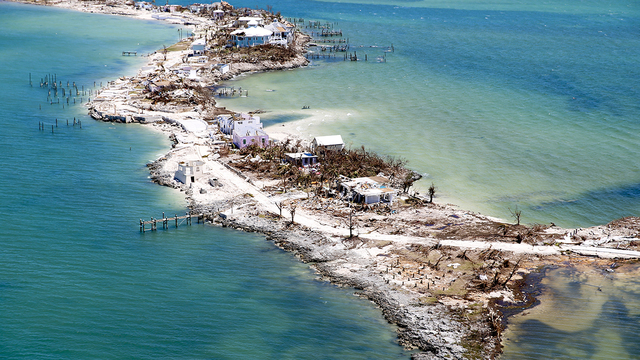Read more about InAlienable.
Support Quixote Center’s InAlienable program!
InAlienable
Daily Dispatch
September 9, 2019

Hurricane Dorian hit the Bahamas last week hard - leaving at least 43 people dead and displacing tens of thousands more. In the wake of the storm, many people are trying to get off the islands - especially Grand Bahama and Abaco which were hit very hard - Abaco may have lost as much as 60 percent of its housing. But where to go? For many, the obvious choice is Florida, which is nearby and there is regular plane and ferry services. However, to enter the United States from the Bahamas requires a visa - and thus far, the Trump administration has not waived this requirement. Which means, anyone seeking to come to the United States must first make their way to Nassau to obtain a visa at the U.S. consulate there.
Confusion about this requirement - as well as good ol’ profiteering in times of crisis - has led to some pretty horrible outcomes. Over the weekend one ferry company forced over 100 people off their ship because the passengers did not have a proper visa for entry into the United States. Customs and Border Patrol’s office in Florida stressed that this decision was made by the company. CBP told the ferry company that the passengers would have to go to Nassau first, and once that was done, all - or almost all - of the people would be allowed in. Apparently the company did not want to be bothered with the extra leg of the trip.
That said, there is increasing pressure on the administration to waive the visa requirement. People would still be processed at ports of entry, passports stamped and so on. But skipping the extra step of requiring a visa would ease the process considerably. As a point of reference, if you are from the United States you can travel almost anywhere in the world without a visa. You simply get an entry card or stamp that denotes your approved time. That's all people ask for. There is not a request for Temporary Protected Status or other deferred action for people from the Bahamas already here.
With Republicans Marco Rubio and Rick Scott pushing the issue, there may be some action on this front. It would be a fairly simple and clearly more humane approach.
Study of asylum seeking families shows more problems with detention
Last week, the San Diego based U.S. Immigration Policy Center released a report about conditions facing asylum seekers at the border. The report was based on a survey of intake forms at shelters run by the San Diego Rapid Response Network and focused primarily on the experiences of families. The lead author, Tom K. Wong, offered a summary view of the report in an Op-ed in the LA Times:
In a report released last week, we found that approximately 35% of the asylum-seeking heads of households we studied reported problems related to conditions in immigration detention, treatment in immigration detention, or medical issues. This finding is alarming since it’s very likely an underestimate, because the SDRRN was focused on providing needed services to the asylum-seeking families, not administering questionnaires. Moreover, abuses or problems in detention may be underreported by asylum seekers who are afraid that raising complaints may negatively affect their asylum case.
The summary from the full report offers some important insights on conditions in detention. Though the report does not specify, the conditions noted here would be in border detention facilities run by Customs and Border Protection.
- For the asylum-seeking heads of households, the average length of time spent in immigration detention was 3.4 days.
- 8.3 percent of the asylum-seeking heads of households reported spending 5 days or more in immigration detention.
- Over 1 out of every 3, or 34.7 percent, of the asylum-seeking heads of households reported issues related to conditions in immigration detention, treatment in detention, or medical issues.
- Conditions in detention:
○ Among those who reported issues in immigration detention, 61.8 percent reported issues related to food and water, including being fed frozen or spoiled food, not having enough to eat, not being given formula for infants, not being given water, and having to drink dirty water, among others.
○ Among those who reported issues in immigration detention, 34.5 percent reported issues related to hygiene, including not being able to shower, dirty bathrooms, and not having a toothbrush or toothpaste to brush their teeth, among others.
○ Among those who reported issues in immigration detention, 45.6 percent reported issues related to not being able to sleep, overcrowded conditions, confinement, and the temperature being too cold in La Hielera.
- Treatment in detention:
○ 232 asylum-seeking heads of households reported verbal abuse, including being told “go back to your fucking country” and “you’re an ape,” among other examples.
○ 40 asylum-seeking heads of households reported physical abuse, including being thrown against a wall, among other examples.
○ 18 asylum-seeking heads of households reported having their physical property taken, including their passports and travel documents, among other examples.
○ 577 asylum-seeking heads of households reported other issues related to their treatment.
- Last, 10.9 percent of the asylum-seeking heads of households that the SDRRN has assisted reported medical issues in immigration detention.
The full report can be read here. Professor Wong’s op-ed discussing the report is here.
One of the impacts of Trump’s effort to get around the Flores settlement agreement would be extended detention for families. For example, instead of being released to family or community sponsors, most of the families in this report would be turned over to Immigration and Customs Enforcement to wait out their asylum process while in custody. Because the Flores settlement agreement includes provision for regular inspection, conditions in these facilities have come to light. If the Flores settlement agreement is bypassed in favor of Trump’s new executive order, such regular, independent, investigations would not happen.